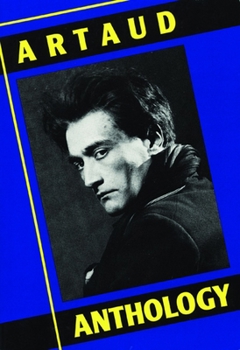Artaud Anthology
Select Format
Select Condition 
Book Overview
"I am the man," wrote Artaud, "who has best charted his inmost self." Antonin Artaud was a great poet who, like Poe, Holderlin, and Nerval, wanted to live in the infinite and asked that the human spirit burn in absolute freedom. To society, he was a madman. Artaud, however, was not insane but in luciferian pursuit of what society keeps hidden. The man who wrote Van Gogh the Man Suicided by Society raged against the insanity of social institutions...
Format:Paperback
Language:English
ISBN:0872860000
ISBN13:9780872860001
Release Date:January 1965
Publisher:City Lights Books
Length:253 Pages
Weight:0.95 lbs.
Dimensions:0.8" x 5.5" x 8.0"
Customer Reviews
3 ratings
NOT madness, but an asphyxiating dive into reality
Published by Thriftbooks.com User , 18 years ago
So many seem to associate the name of Artaud with madness, decadence, the postmodern "I'm-too-hip-to-care-but-I-still-think-deeply" attitude. Nothing could be further from the truth. Antonin Artaud was a man interested in nothing less than the violent exhumation of real life from the cold, icy tomb that civilization has attempted to seal it in. As we see here in his letters to the sympathetic, but ultimately helpless Jacques Riviere, Artaud's suffered from a kind of hypochondria of the mind which resulted from his scorching intensity of thought. He explicitly rejected happiness as the goal of human existence, and this is what separated him not only from the surrealists but from other thinkers of his age and ours. Perhaps he put it best himself in his own strange, archaic language: "For nothing bestializes a being like the taste for eternal happiness, the search for eternal happiness at any price, and mademoiselle Lucifer is that slut who never wanted to abandon eternal happiness." There will be nothing in this anthology that the Artaud admirer has not already seen, although the whole text (particularly the photographs of Artaud starring in Dreyer's "Joan of Arc" and Gance's "Napoleon"), comes together like a bizarre little work of art. I have referred to it repeatedly, given it away, purchased it again. The most important piece that this little publication has to offer is "I Hate and Renounce As a Coward"..., which is at the very end:the closest thing we have to a coherent philosophical position from Artaud. Also, "Van Gogh:The Man Suicided By Society", which is more about Artaud than Van Gogh, gives us an indispensable glimpse into the psyche of the genuinely tortured, doomed artist. There are moments in which Artaud becomes as important in his commentary on the human condition, as thinkers like Nietzsche, Plato, Pascal, and all of the greats. Unlike in their work, though, it is not maintained consistently. This is also the case with his poetry. His internal anguish did not allow him to consummate his enormous potential. His value lies in the threat he poses to our complacency simply by virtue of his memory. Read "The Theatre And It's Double" first, and then tear through this. Savor Artaud's sentences as you would a delicate meal you'd never tasted before. May the looming shadow of this demented renaissance man never stop haunting us.
Artaud's thoughts on fire.....
Published by Thriftbooks.com User , 22 years ago
This book really puts Artaud's thoughts into perspective. The wonderful madness that inspires one to escape reality and see over that edge of sanity is written here.
Cruel World
Published by Thriftbooks.com User , 23 years ago
Of all twentieth century dramatists, Antonin Artaud is perhaps the most enigmatic. The facts of his life are stark and austere, and his work is a painful movement through many silences and journeys.Even the less initiated student of Artaud will know this writer as someone who deals with uncomfortable and taboo subjects. Among more established critics, too, Artaud continues to attract highly polarised critical opinions. When faced with Artaud's works, the critic's approach seems to be either resolutely textual, bracketing off the human element and referring only to the language on the printed page, or it is predicated on the notion that the biography of the writer must be taken into account in showing how Artaud's texts came to be written. In the first kind of reading, Artaud's texts are dehumanized. In the second, Artaud's works are bracketed off as symptoms of the dramatist's deviant mental or spiritual state, and the labels that have been attached to him (from gnostic to schizophrenic) are taken as reliable pointers to his works. While textual readings offer a definite advantage, in that they approach Artaud's writings without preconceived ideas about the writer's life, aspects of Artaud's life, in particular his scabrous attitude to the traditions of the literary world, seem too important to leave out of account in any discussion of the dramatist's works. Within Artaud's writings here, there is a specific, reflexive relationship between art and life, the one illuminating the other. One can see there is no convenient distinction to be made between Artaud the man and Artaud the writer, he was one and the same, these writings are an ejoyable entrance into that sphere...




